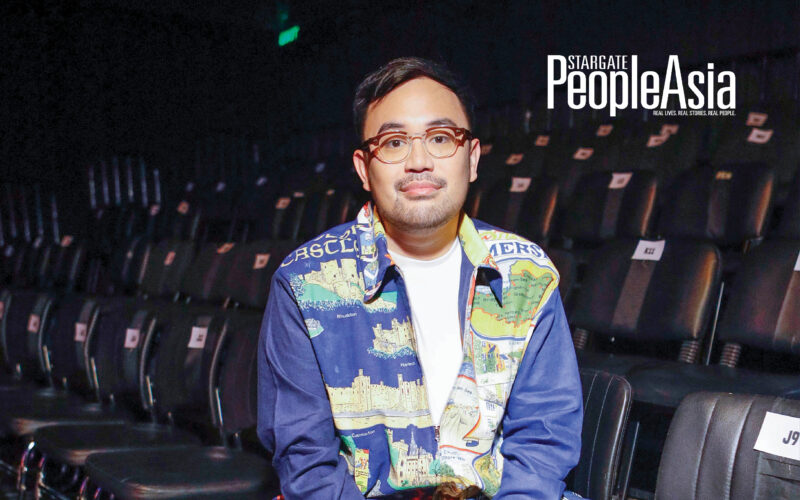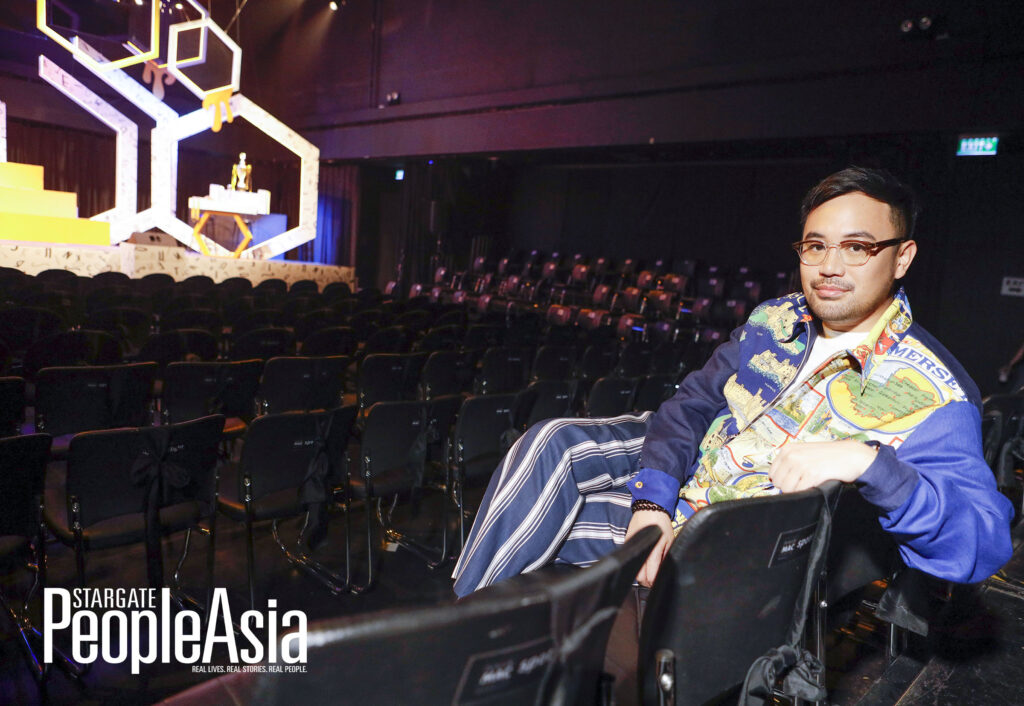Having been exposed to various aspects of the performing arts at a young age, he has channeled his experience as a writer, theater director, producer and even former actor in crafting groundbreaking laws, foremost of which is the Philippine Creative Industries Development Act, to advance its many causes.
By FRANCINE Y. MEDINA
“There’s been a lot of heartbreak, a lot of frustration, a lot preaching to the choir. It’s like a few steps forward, a few steps backward. But what keeps me going is that vision — that creative future I imagine,” says Rep. Christopher “Toff” de Venecia, writer, theater director, producer and proponent of the landmark law securing an encouraging future for Filipino creatives.
“The future is creative,” the tenacious representative from Pangasinan’s Fourth District likes to say. And with his dogged determination to champion the cause of fellow artists across various fields, Republic Act No. 11904 finally brought into reality the Philippine Creative Industries Development Act (PCIDA), which was enacted in July 2022.
De Venecia authored the House version of the law, which he filed in 2020. It had been the first year of the pandemic and the young lawmaker realized the economic shock, especially for those in the creative sector, which was considered a “non-essential” industry then. But truth be told, those in the creative field — artists, talents, event organizers, both online and offline, producers and production experts — bridged the communication gap and helped countless people keep their wits about during that period of isolation and uncertainty.
Unity in spirit
Meanwhile, on the legislative level, and despite differences in points of view between members of the House and Senate, common ground was ultimately reached with “unity in spirit,” as de Venecia mentioned, which led to the ratification of the Act’s final version.
Fast forward to the present. The Philippine Creative Industries Development Council has now been formed as part of the Act and is under the Department of Trade and Industry. The Council, where de Venecia is active, aims to support Filipino creatives by boosting employment security and opportunities and promoting their welfare as workers.
“Things are looking up; we’re firming up plans enshrined with this law,” he says. “So far, the body has provided grants and mounted Fiesta Haraya activities celebrating creative content and the local creative industry.
“There are still so many challenges, but we’re managing and we’re doing the best that we can. Obviously, we in the creative industry are all fueled by our passion and we’ll keep going because we’re doing what we love.”
The representative pointed out some ongoing issues that slow down creatives. There are the cumbersome layers of bureaucracy, for instance, that members of the sector go through for permits, taxes and secure social benefits.
And then there’s also the matter of the Intellectual Property (IP) itself. Among the next steps that he hopes the council will investigate is launching a one-stop hub where IP can be protected as well as monetized and leveraged for better productivity.
Sharing his own experience, he says, “As a theater producer, I know how it is to pay for licenses of foreign theater productions that we mount locally. These theater plays come with a high cost. I was thinking, if we pay for the license of these works, why can’t we do that to our own IPs?
“We’ve had successful runs of Rak of Aegis, Ang Huling El Bimbo, the upcoming PETA musical titled One More Chance, which has already sold-out tickets and the Parokya ni Edgar musical that’s coming up. There are so many Filipino IPs, but we haven’t crossed that bridge yet for licensing so that other theater companies from other countries can mount our shows, perhaps adapt or translate them according to their own language.”
De Venecia’s grasp of the creative industry’s concerns has obviously been deepened by his experiences as The Sandbox Collective theater company’s co-founder and artistic managing director. But the award-winning stage director — he has received accolades from Broadway World and the Gawad Buhay Awards — has the arts and the creative field in his lineage, too.
He is the son of former House Speaker Joe de Venecia and former Rep. Gina de Venecia, who are both known as arts and culture patrons. His mother’s maternal grandfather was Doc José Perez, an iconic figure in the film industry and the star builder of Sampaguita Pictures. De Venecia’s great-grandfather was the legendary José O. Vera, who was a senator and one of the founders of Philippine movies. A great granduncle on his father’s side was National Artist and the “Father of Modern Philippine Painting,” Victorio Edades.
“There are still so many challenges, but we’re managing and we’re doing the best that we can. Obviously, we in the creative industry are all fueled by our passion and we’ll keep going because we’re doing what we love.”
Eye on the goal
With the landmark law now in place, de Venecia is looking towards the Philippines becoming the number one creative economy in the ASEAN region by 2030.
“How do we even get there? How can we do it? How will we be able to go past Singapore, Thailand, even Indonesia, which is having a big creative economy push? Indonesia now has the Ministry of Tourism and Creative Economy and they are positioning themselves in the creative economy space by hosting the yearly World Creative Economy Conference — giving the message to the rest of the world that they’re there to lead,” he says.
“Our neighbors are doing so much and here we are. We had just passed the law, and we’re just starting to recognize our own creative economy. And I’d like to ask again: how is that even possible, how do we get there?”
That glimmer of hope that’s inspiring him, he mentions, is a United Nations Conference on Trade and Development study in 2018 that revealed the Philippines as the top exporter of creative talents in the region: “That didn’t come as a surprise to me as we’ve always known the Filipino as service-oriented. Our brand of service is really bar none. Our real competitive edge is the creativity of our people.”
De Venecia’s foresight may be spot on. A Philippine Statistics Authority report released in March showed that the Philippine creative economy contributed P1.72 trillion or 7.1 percent to the country’s gross domestic product (GDP) in 2023. This is a remarkable boost of 6.9 percent from the P1.61 trillion recorded value to the GDP in 2022. Likewise, in 2023, the creative industry gave jobs to 7.26 million people — a four percent growth from 6.98 million persons in 2022.
Very promising prospects, indeed, for the country’s emerging creative economy.
The future is now
Aside from reforms in policies, de Venecia says that misconceptions about joining the creative economy are also part of the many barriers that need to be broken. He adds, “When I say the future is creative, it’s not even about our generation anymore. We’re talking about the next generation. They should be able to freely pursue their passions and not be discouraged by the age-old mindset that there’s no money in the creative economy. Parents still tell their kids that they can’t make a living as an artist, so go and take up medicine or a STEM (science, technology, engineering and mathematics) course.
“I feel that declaring that you’re joining the creative economy is like coming out to your parents,” he says. “It’s like you need to announce that you’re a creative ready to go on this creative journey. We don’t want that to be the case forever. We want our creative youth to freely explore having a career in the creative industry, knowing that, yes, it could be sustainable, legitimate, honorable and gives pride to the country. That’s the way the creative economy should be. And that’s why I keep fighting for it. It’s worth planting the seeds.”
In his last term in Congress, the passage of PCIDA brings de Venecia’s unrelenting efforts full circle. He may be leaving his office, he says, but he’ll continue to be active in the industry that raised him and drove him towards working for positive change.
“There is a line in the musical Hamilton that resonated in me: ‘What is legacy but planting seeds in the garden that you will never see?’
“That really moved me. I started really crying in silence when that line was said during one of the intense scenes in the show. When you reflect on this entire creative economy crusade that I’ve been on since 2020, I know that I might not even see its ripple effect. But that’s what we’re doing right now anyway — we’re planting seeds so that those who dream to be creatives can become one and thrive in the future.”
Photography by DIX PEREZ
Art Direction by DEXTER FRANCIS DE VERA
Styling by ROKO ARCEO
Shot on location at Power Mac Center Spotlight Blackbox Theater, Circuit Ayala







